Sometimes Opportunity Is Only A Friend Away
Written by Tony Mussari
Edited by Kitch Loftus-Mussari
Copyright 2012
Mussari-Loftus Associates
All Rights Reserved
The Face of America Project
"Fellow-Citizens, we cannot escape history." Abraham Lincoln
Reliving October 28, 1960
Bill Kashatus is a teacher, a writer and a friend.
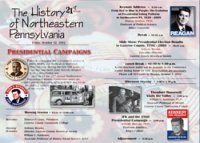
He loves history, and he shares that love with everyone he meets.
He works diligently to organize an annual conference that helps students, teachers and guests better understand the history of our area. This year the conference focused on presidential campaigns. It was cosponsored by the Luzerne County Historical Society and Luzerne County Community College.
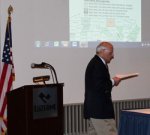 Dr. Thomas Baldino, professor of Political Science at Wilkes University, presented an interesting paper on the evolution of voting patterns in Northeastern PA. He identified six key or transitional presidential elections and he carefully explained how the political complexion of our section of the Commonwealth has changed over the years.
Dr. Thomas Baldino, professor of Political Science at Wilkes University, presented an interesting paper on the evolution of voting patterns in Northeastern PA. He identified six key or transitional presidential elections and he carefully explained how the political complexion of our section of the Commonwealth has changed over the years.
Tony Brooks, the Executive Director of the Luzerne County Historical Society, took his listeners on a journey from the very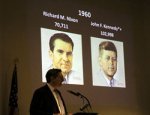 first presidential election to the 2008 election. Using a well-organized PowerPoint Presentation, he brought the candidates and the election results to life.
first presidential election to the 2008 election. Using a well-organized PowerPoint Presentation, he brought the candidates and the election results to life.
Dr. Kashatus opened the afternoon session with an informative 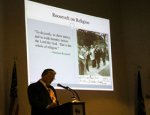 and thoughtful analysis of President Theodore Roosevelt and his many trips to our little corner of the world.
and thoughtful analysis of President Theodore Roosevelt and his many trips to our little corner of the world.
One of his slides caught my attention. It was designed to explain “TR’s” thoughts on religion. It read:
“To do justly, to show mercy, and to walk humbly before the Lord thy God.”
After I read the slide, I thought to myself, in 14 words, President Roosevelt said it all.
My moment came at 2 p.m., when I was given an opportunity to discuss our documentary JFK: One Day in October. Kitch and I produced this documentary without a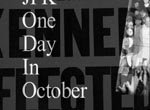 budget in 2003 as a special edition of our What Is America? series. It was our attempt to explain the way JFK’s visit to Wilkes-Barre and Scranton on October 28, 1960, impacted 18-year-old kids like me. To be very honest, it was one of the more difficult assignments of my life, because that visit had a profound impact on my life.
budget in 2003 as a special edition of our What Is America? series. It was our attempt to explain the way JFK’s visit to Wilkes-Barre and Scranton on October 28, 1960, impacted 18-year-old kids like me. To be very honest, it was one of the more difficult assignments of my life, because that visit had a profound impact on my life.
Whatever anyone might think of John of Kennedy and his Presidency, one thing is certain, it made young people believe that a life in public service could be a life well spent. He made many World War II babies believe that we could make a difference, and he presented a face of America to the world that was admired around the world.
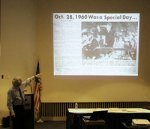 Throughout the presentation, I was thinking about my son who is in a very difficult place at the moment. I was thinking about my parents and the sacrifices they made for their children so we could have a better life. In return we felt an obligation to honor their sacrifices by making something of ourselves.
Throughout the presentation, I was thinking about my son who is in a very difficult place at the moment. I was thinking about my parents and the sacrifices they made for their children so we could have a better life. In return we felt an obligation to honor their sacrifices by making something of ourselves.
I was thinking about one of my classmates, Pat Mulloy, who became the Assistant Secretary of Commerce of the United States, and a well respected member of the Foreign Service. He is one of the 16 people who was featured in our documentary.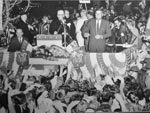
I was thinking about the accomplishments and the distinguished service of my high school debate partner Peter Smith, a hometown boy, who 52 years after Kennedy’s visit is a US attorney determined to root out corruption wherever he finds it in Northeastern Pennsylvania.
In my opinion, the first steps toward the noble accomplishments of Pat Mulloy and Pete Smith were taken that autumn afternoon on Public Square in Wilkes-Barre, PA, eight days before John F. Kennedy was elected President of the United States, and 100 years after his predecessor, Abraham Lincoln, won the presidency.
During the session, my eyes were drawn to a diminutive woman dressed in traditional Muslim attire. I invited her and her friend 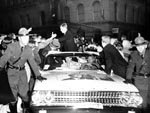 to stay for the session so I could introduce them to JFK the candidate, JFK the motivator, JFK the inspiration for thousands of young people who spent a lifetime “waiting for the snow” just like Thomas Scanlon who was one of the first young Americans to serve overseas in President Kennedys’ Peace Corps.
to stay for the session so I could introduce them to JFK the candidate, JFK the motivator, JFK the inspiration for thousands of young people who spent a lifetime “waiting for the snow” just like Thomas Scanlon who was one of the first young Americans to serve overseas in President Kennedys’ Peace Corps.
Tom Scanlon was a Peace Corps volunteer in Chile from 1961 to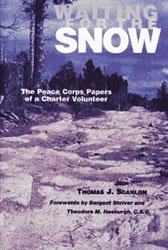 1963. He coined the phrase waiting for the snow to describe his willingness to endure hardship to serve people in need.
1963. He coined the phrase waiting for the snow to describe his willingness to endure hardship to serve people in need.
While speaking to a group of Peace Corps recruits, President Kennedy complimented Tom Scanlon, and he shared his story and his phase “waiting for the snow” to encourage Pease Corps volunteers to go out of their way to help people in need.
Tom Scanlon was director of the Public Welfare Fund for 34 years. During his tenure, its assets rose from $20 million to over $600 million.
He founded Benchmarks a unique consulting company dedicated to serving countries with innovative social development programs.
In 1996, Mr. Scanlon published a book entitled Waiting For The Snow.
Tom Scanlon’s hometown, Scranton, PA, was the final stop during JFK’s October 28, Visit. Without question, Tom Scanlon’s life reflects the light of an extraordinary Face of America on its very best day.
Before the conference ended, the students I asked to stay told me they were glad they did. They liked the message and the challenge of JFK.
At this conference, I saw past, present and future faces of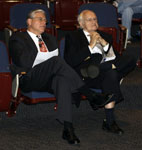 America at its best. I experienced America thinking, learning, sharing, growing and coming together in community.
America at its best. I experienced America thinking, learning, sharing, growing and coming together in community.
The teachers were filled with a wonderful spirit of giving. The students were interested, impressive and very interesting. They wanted to better understand what presidential politics is all about. More important was their desire to figure out what their role was in this vital process.
 In a moment of absolute brilliance, one of the students, Michael Feeney, responded to a question from a speaker with these words:
In a moment of absolute brilliance, one of the students, Michael Feeney, responded to a question from a speaker with these words:
“I don’t think I can give you an answer. I am just learning and forming my opinion.”
I saw the qualities of a teacher written all over Michael’s heart and soul, and when I got the opportunity, I was quick to tell him to consider teaching as a career.
Bill Kashatus and Tony Brooks are doing their best to preserve our history. They know that Abraham Lincoln was right, “We can’t escape history.”
In my opinion, Bill Kashatus and Tony brooks are examples of America at its best.
Please provide feedback to:
tony.mussari@gmail.com